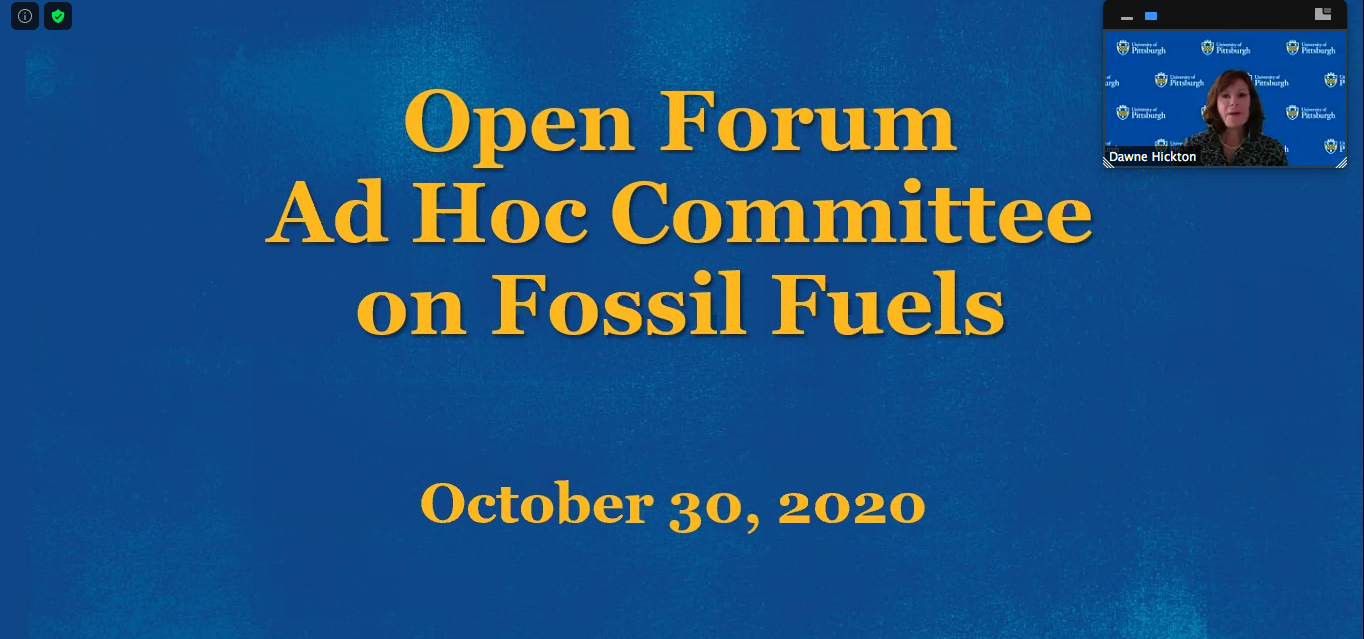Community members urge divestment at forum


The Ad Hoc Committee on Fossil Fuels held an open forum Friday morning to allow students, faculty and alumni to provide feedback about the University’s $4.3-billion endowment.
The Board of Trustees committee charged with investigating whether Pitt should divest its $4.3 billion endowment of fossil fuels held an open forum Friday morning to allow students, faculty and alumni to share their feedback on the matter. The panel hosted another open forum last Wednesday.
Chairperson Dawne Hickton, an executive vice president at Jacobs Engineering Group, led the forum along with three other committee members:
- Diane Holder, the president and CEO of UPMC Health Plan
- John Maher III, former representative for District 40 in the Pennsylvania House of Representatives
- Marlee Myers, a partner at Morgan Lewis
Chief Financial Officer Hari Sastry, Kathy Humphrey, senior vice chancellor for engagement and secretary of the Board of Trustees and Aurora Sharrard, the University’s sustainability director, joined as well.
The committee is tasked with providing a report by Jan. 15, 2021, with options on “whether, to what extent and via what methods the University, in its endowment, should consider divestment from fossil fuels in existing and/or future investments.”
The board formed the committee in June after years of pressure from the student body, including groups such as the Fossil Free Pitt Coalition, who staged a 12-day sit-in at the Cathedral of Learning last spring, as well as a protest at February’s board meeting. The Board of Trustees unanimously approved a formal socially responsible investing process and committed to carbon neutrality by 2037 in February.
Ellen Oordt, a junior studying ecology and evolution and member of the Fossil Free Pitt Coalition, said climate change disproportionately affects people of color within the state, and the world as a whole.
“Divestment will by no means end the systemic racism present within the University of Pittsburgh, but it is an opportunity to make that conscious change in the right direction,” Oordt said.
Oordt read Chancellor Patrick Gallagher’s statement on the University’s actions for improving racial inequality, in which Gallagher said Pitt would take a closer look at every aspect of itself, including financial decisions.
“This is an institution capable of making positive change. But are these words just empty promises? Do we as a University truly tackle great challenges or do we like to say that to uphold a facade of being socially conscious in a progressive institution?” Oordt said. “I would say $4.3 billion is a pretty powerful financial investment.”
Joshua Ash, a graduate student in the Graduate School of Public and International Affairs, said there is a lack of trust as well as a gap between University decision-makers and students and professors.
“I think it’s important to note that a university is constantly changing,” Ash said. “The University is a living, breathing thing with changing ideas and the professors and students who make up the University today overwhelmingly support action here.”
Prem Rajgopal, a recent Pitt alumnus and organizing fellow at the Center for Coalfield Justice, said by investing in fossil fuels, Pitt is putting profit over people. Rajgopal also read the UN’s 17 Sustainable Development Goals, a set of guidelines to protect the planet.
“Fossil fuels are not sustainable,” Rajgopal said. “76% of greenhouse gas emissions are a result of fossil fuels in the United States.”
Tony Kerzmann, an associate professor of mechanical engineering, said scientists have made it abundantly clear that fossil fuels are a huge danger to the planet.
“Climatologists have been ringing the alarm as loud as their platform would allow,” Kerzmann said. “As a concerned engineer, husband and father, I’m asking the committee to stop supporting fossil fuel companies.”
Recent Posts
Editorial | Pitt Administration must listen to its students’ electoral demands
The passing of these referendums does not guarantee a future Pitt with these policies. Merely,…
“Natural leader”: Blaire Bayless looks to showcase loyalty and talent in 2025
Blaire Bayless has always shown loyalty. It’s a trait about her that has never been…
‘We want the work and we like the work’: Pitt lacrosse takes down Liberty and anticipates the season ahead
Pitt women’s lacrosse took on Liberty at home at Highmark Stadium on Wednesday. Their 15-6…
Column | Pitt men’s basketball season was not decided by one call
There are five seconds left, and the game is tied at 54 a piece. Notre…
Column | Why the Mason Rudolph reunion is a great move for the Steelers
My, how the mighty have fallen. The Pittsburgh Steelers were the pinnacle of stability for…
Multiple families of trans kids denied gender-affirming medications at UPMC Children’s Hospital of Pittsburgh
Multiple families of transgender children said UPMC Children’s Hospital of Pittsburgh has denied access to…


